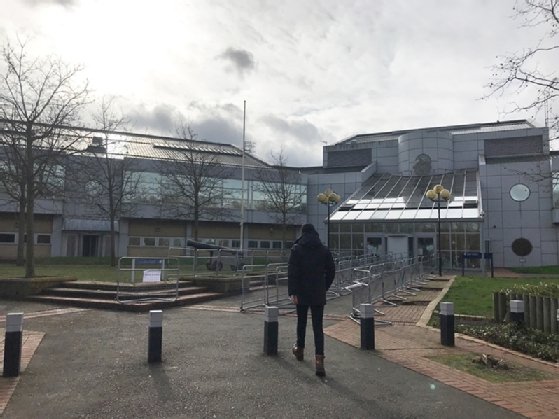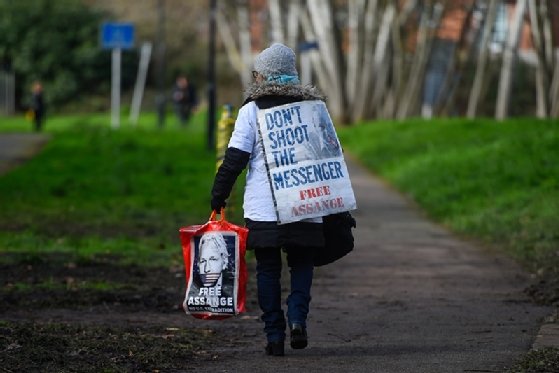
Getty Images
WikiLeaks founder Julian Assange cannot be legally extradited for ‘political offences’, say lawyers
Lawyers for WikiLeaks founder Julian Assange argue that he has been charged with political offences and cannot be legally extradited to the US under the US-UK extradition treaty
Lawyers for WikiLeaks founder Julian Assange argued today that it would be illegal to extradite him to face trial in the US for “political offences”.
Edward Fitzgerald, representing Assange, told Woolwich Crown Court that Article 4(1) of the Anglo-US Extradition Treaty 2003 states that extraditions shall not be granted for a “political offence”.
This was an “essential and fundamental protection which the US puts in every single one of its extradition treaties”, said Fitzgerald during legal arguments in court on 26 February.
He added: “If it is not a terrorist case, not a violent offence, then the principle that you should not be extradited for a political offence is of virtually universal application. It dates back more than 100 years.
“The US, of course, writes it into every treaty because they don’t want their citizens being extradited for political offences. But when someone invokes it the other way, they say, you cannot rely on it.”
Fitzgerald told the court that if the extradition was granted, it would breach Assange’s right to liberty under Article 5 of the European Convention on Human Rights, which protects individuals from unreasonable detention.
Assange is wanted to face trial on 17 charges under the Espionage Act and conspiracy to commit computer intrusion after the publication of hundreds of thousands of classified documents in 2010 and 2011.
Prosecutors say he committed “common criminality” by plotting to hack into, and steal, state secrets from US Department of Defense computers, along with former US Army intelligence analyst Chelsea Manning.
The prosecutors argue that the case is covered only by the UK’s 2003 Extradition Act, which, unlike the Anglo-US treaty, makes no exception for political offences.
Read more about Julian Assange’s extradition hearing
- Julian Assange phoned White House to warn of risk to lives.
- Julian Assange extradition is a politically motivated ‘abuse of power’, court hears.
- WikiLeaks founder Julian Assange ‘put lives at risk’ by disclosing names in leaked documents, court hears.
- US ‘breached due process’ in spying operation against Julian Assange’s lawyers.
Fitzgerald compared Assange’s case to the one against former GCHQ translator Katharine Gun, who was cleared of breaching the Official Secrets Act after leaking material relating to the Iraq war to The Observer newspaper in 2003. The case was dropped a year later, when prosecutors offered no evidence.
“Had Katharine Gun’s prosecution continued and had she fled to another country, she would have been able to say this is a purely political offence,” said Fitzgerald.
The lawyer also cited the 1895 conviction of French artillery officer Alfred Dreyfus at a court martial on treason charges that many felt were brought against him because he was Jewish.
Dreyfus was later exonerated after a long campaign led by the likes of novelist Emile Zola, who wrote a denunciation of the prosecution case entitled J’Accuse (I accuse).
“Dreyfus was charged with espionage by providing information to the German armed forces,” said Fitzgerald. “It turned out to be a totally false and wrongful allegation.
“There is no doubt that had he gone to the UK, and the French had sought extradition, it would have been a political offence even if the allegations had been accepted.”
Fitzgerald said that in those circumstances, Dreyfus could not have been extradited to France.
Assange says lawyers were spied on
During the case on Wednesday afternoon, Assange complained that his lawyers had been spied on.
He asked to be allowed to leave the secure dock, where he was flanked by two security guards, to sit with his legal team in the well of the court. Assange voiced his concerns after District Judge Vanessa Baraitser stopped proceedings to ask if he was having trouble concentrating.

Speaking from behind the glass in the dock, Assange said: “The problem is, I’m not a participant in these proceedings. I can’t speak to my lawyers in confidentiality. There’s a whole series of people sitting there and there’s microphones. I can’t, with any confidence, give [my solicitor] any instructions. This case already has enough spies on my lawyers as it is.”
The court has previously heard claims that lawyers for Assange were spied on when they visited him in the Ecuadorian Embassy in London, where he stayed for almost seven years.
Judge Baraitser said: “Defendants don’t normally have a voice unless and until they decide to give evidence. I’m going to stop you because I wouldn’t normally allow [this]. There is no reason to make an exception in your case, I’m afraid.”
After a short break, Fitzgerald asked if Assange could sit with his legal team outside the dock. The lawyer described his client as a “gentle man of an intellectual nature” and claimed he posed no security risk.
“Mr Assange is finding it [the proceedings] very difficult and understandably feels it is very unfair that he cannot properly communicate with us while proceedings are going on,” said Fitzgerald.
Judge Baraitser said: “I strongly suspect security officials wouldn’t be able to accommodate that.”
She said the arrangements for Assange’s case were no different from those in any other extradition proceedings or criminal trial.
Earlier, James Lewis QC, for the US government, argued that the defence case contained a series of “fundamental errors”.
He said: “Mr Assange has no right to argue a political offence exception...it has been abrogated by Parliament.”
The case will continue on Thursday.







